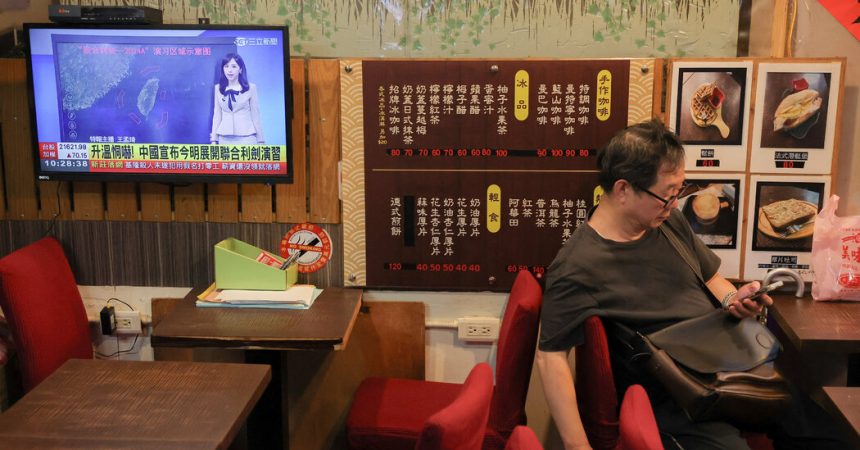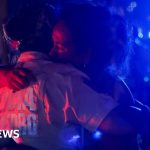China launched on Thursday two days of military drills surrounding Taiwan in what it called a “strong punishment” to its opponents on the self-governing island, after Taiwan’s new president pledged to defend its sovereignty.
The drills were the first substantive response by China to the swearing-in of President Lai Ching-te, whom Beijing dislikes, in Taipei on Monday. Mr. Lai’s political party asserts Taiwan’s separate status from China, and in a high-profile inaugural speech, he vowed to keep Taiwan’s democracy safe from Chinese pressure.
China, which claims Taiwan as its territory, had mainly responded to Mr. Lai’s speech with sharply worded criticism. But it escalated its response Thursday by announcing that it was conducting sea and air exercises that would encircle Taiwan and draw close to the Taiwanese islands of Kinmen, Matsu, Wuqiu and Dongyin in the Taiwan Strait.
China did not say how many planes and ships it was deploying in the exercise. The last time it held a major drill in multiple locations around Taiwan was in April 2023, after Kevin McCarthy, then the speaker of the House of Representatives, met with the president of Taiwan at the time, Tsai Ing-wen. Beijing opposes such exchanges with the island’s leaders.
China conducted the largest of such exercises in recent years in August 2022 to protest the visit to Taiwan of Nancy Pelosi, who was also the House speaker at the time. Those drills, which included the firing of Chinese missiles near and over Taiwan, covered six swaths of sea surrounding the island, three of which appeared to overlap with areas that Taiwan regards as its territorial waters. Those exercises lasted four days, and China conducted additional exercises for several days after.
Li Xi, a spokesman of the Eastern Theater Command of the Chinese People’s Liberation Army, said the latest exercises served as “strong punishment” for “Taiwan independence forces,” according to Chinese state media, and “a stern warning against the interference and provocation by external forces,” a reference to the United States.
In a statement, Taiwan’s defense ministry called the drills “irrational provocations” that undermined “regional peace and stability.” The ministry also posted on X, saying, “We stand ready with firm will and restraint. We seek no conflicts, but we will not shy away from one. We have the confidence to safeguard our national security.”
Even as Mr. Lai pledged to protect Taiwan in his speech, he had sought to strike a conciliatory note in other ways, signaling that he remained open to holding talks with Beijing — which China had frozen in 2016 — and to resuming cross-strait tourism.
But China took offense to Mr. Lai’s assertion that the sides were equal — he had said that they “are not subordinate to each other” — and his emphasis on Taiwan’s democratic identity and warnings against threats from China.
After the speech, Beijing accused Mr. Lai of promoting formal independence for Taiwan and said the new president was more dangerous than his predecessors. Wang Yi, China’s top foreign policy official, said this week: “The ugly acts of Lai Ching-te and others who betray the nation and their ancestors is disgraceful,” according to China’s Foreign Ministry. “All Taiwan independence separatists will be nailed to the pillar of shame in history.”
Taiwanese officials and military experts have been expecting China to make a show of military force after Mr. Lai’s inauguration. Ma Chen-kun, a professor at Taiwan’s National Defense University, said the People’s Liberation Army was likely to continue exerting its presence, including around the Kinmen and Matsu islands close to the Chinese mainland.
The exercises could teach the People’s Liberation Army valuable lessons about how to impose a possible “quarantine” or blockade around Taiwan. Many experts believe that if the Chinese government tries to force Taiwan to accept unification, it may first attempt using a ring of military forces to severely restrict air and sea access to the island.
Chieh Chung, an adjunct assistant professor of strategic studies at Tamkang University in Taiwan, said that the scope and nature of the exercises China has announced indicated that the drill was “based on various stages of an invasion of Taiwan.” The exercise could be a way to assess including Taiwan’s outlying islands in any attempt at a blockade, he said. Unlike in the larger exercises China conducted in the last two years, this week’s might feature training to seize one of those islands, Mr. Chieh said.
The drills could also provide different branches of the People’s Liberation Army and the Chinese Coast Guard with an opportunity to coordinate their forces. The Coast Guard in Fujian, the coastal province facing Taiwan, announced that it would conduct a “comprehensive law enforcement exercise” around the islands of Wuqiu and Dongyin, Chinese state media said.
“The simultaneous conduct of the law enforcement activity with the P.L.A. military exercise further allows China to train its P.L.A. to engage in coordinated activities with its Coast Guard across a large area around Taiwan,” said Bonny Lin, a senior fellow for Asian security at the Center for Strategic and International Studies.
“This could be invaluable experience for a range of operations against Taiwan,” added Ms. Lin, who is one of the authors of a study to be published later this month on how China could impose a maritime quarantine around Taiwan.
Ja Ian Chong, an associate professor of political science at the National University of Singapore, said he was also studying how close the Chinese forces get to Taiwan, and “whether they intend to disrupt transport, communications, and daily life,” he said, or attempt to “cut off Taiwan from some of the outlying islands.”
Mr. Chong noted that Beijing sought to cast Mr. Lai as a pro-independence troublemaker who would bring war to Taiwan when he was running in the presidential election, long before he made his inauguration speech.
“Beijing seems resolved to put pressure on Taiwan, regardless of what Lai said or didn’t say” in his speech, Mr. Chong said, unless he accepted or endorsed China’s framework for the sides and its argument for unification. But most people in Taiwan are opposed to being absorbed by the People’s Republic of China, and are instead in favor of maintaining the status quo.
Beijing could be “hoping that domestic opposition and external pressure will frustrate Lai, make him more risk acceptant, and make mistakes,” Mr. Chong said. “Beijing can then capitalize on these mistakes to paint Lai as a source of instability and isolate him from the Taiwan public and Taiwan from the rest of the world.”
Chris Buckley contributed reporting.






